Andrew Beatty, BSc Physics Specialist '91
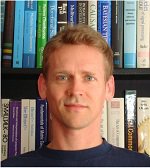
Tell us about your current position and career.
I did an M.Sc. in Computer Science at UBC graduating in 1994, specializing in computer vision. I then worked at International Submarine Engineering for 3.5 years where I designed and implemented the computer vision system for the Shell SmartPump which is a fully automated car refueling robot. We also had operation prototypes in several gas stations in California. Then I founded my current software technology company along with a colleague called www.facegen.com. In this capacity I have licensed technology to most major game developers and many universities and tech start-ups.
How has your Physics education helped you in your career?
Physics gives you a strong mathematical/intuitive background which is an advantage in any technical field. I use this background daily for algorithms and applied mathematics.
Chris Meyer, BSc Physics Specialist '97
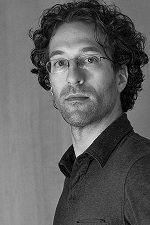
Tell us about your current position and career.
I am a high school physics teacher at York Mills Collegiate Institute in Toronto.
How has your Physics education helped you in your career?
In addition to the daily teaching of physics in the classroom, I am deeply involved with Physics Education Research. I have a developed a Grade 11 and 12 Physics program that is regarded as a leading example in Ontario of active-learning, inquiry-based education. My work was in part inspired by the new first-year Physics labs, the “Practical” at University of Toronto, as developed by David Harrison, Jason Harlow, and others. I have been writing articles and giving workshops about my teaching techniques across southern Ontario for the past three years. More information is available from my website: www.meyercreations.com/physics
Ernest Chan, BSc Physics Specialist '88
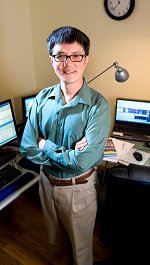
Tell us about your current position and career.
Principal, QTS Capital Management, LLC., Quantitative Portfolio Management
Author, "Quantitative Trading" (Wiley 2010), "Algorithmic Trading" (Wiley, 2013)
Blogger, epchan.blogspot.com
Adjunct Associate Professor of Finance, NTU
How has your Physics education helped you in your career?
My education and training at the University of Toronto has given me concrete skills in lab/math computation, critical thinking, problem solving, and being at ease with technology. Problem solving and analytical techniques are fundamental to my career.
Miriam Paton, BSc Physics/Mathematics Specialist '90
Tell us about your current position and career.
I pursued an M.Sc. in Physics overseas and also have a law degree from England. I now own my own business. I am a registered patent agent, working with companies to protect their innovations and with foreign patent firms to help their clients obtain patent protection in Canada.
How has your Physics education helped you in your career?
My training in physics honed my analytical skills. My ability to learn quickly, to ask probing questions, and to understand new ideas in different disciplines at an abstract level, all result from my education.
Sara Poirier, HBSc Physics/Astronomy Major '99

Tell us about your current position and career.
I worked as a research assistant in the Department of Astronomy and at NASA's Goddard Spaceflight Centre before joining the Ontario Science Centre in 2001 where I am currently a Researcher/Programmer in Astronomy and Space Sciences at the Ontario Science Centre. I enjoy the opportunity to creatively apply my experience in the development of exhibits and programs related to Astronomy and Space Sciences and in the production of shows for the Ontario Science Centre’s new CA Planetarium. In 2006, I completed graduate coursework at the International Space University, specializing in the human exploration of space. I enjoy sharing my enthusiasm for Astronomy and Space Sciences with the public and make frequent appearances on local and national media. In addition to critical thinking and problem solving, studying physics taught me how break down complex concepts into fundamental ideas. These skills have been invaluable in my work in science communication.
Randy Enkin, BSc Physics Specialist '83, MSc Physics '86
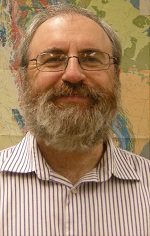
Tell us about your current position and career.
I have been a Research Scientist at the Geological Survey of Canada at the Pacific Geoscience Centre in Sidney, British Columbia since 1993.
I head the Geological Survey of Canada Paleomagnetism and Petrophysics Laboratory. My research involves many applications of physics to the earth sciences. As a paleomagnetist, I use the magnetic remanence of rocks to determine how the continents have drifted, mountains have deformed, and fluids have flowed through the rocks to create Canada's mineral wealth. By measuring the density, magnetic, and electric properties of rocks, we link geophysical analysis to geological mapping to locate mineral deposits. We measure the physical properties of marine sediments to date ancient earthquakes to help construct the best National Building Code.
For 30 years, I have been directly applying the material I learned as an undergrad at the University of Toronto. I still refer to my original textbooks, and recall vividly the excellent lectures by my professors including Derek York, Ted Litherland, Gordon West, and of course my M.Sc. supervisor, David Dunlop. Particularly important was my first summer research job with Ron Farquhar, which got me headed towards geophysics.
How has your Physics education helped you in your career?
As an undergrad, I was active in the Physics and Astronomy Students Union, capped by our organizing the 1983 Canadian University Physics Conference. My work in science outreach continues to today, as I am currently president of the society which organizes the Vancouver Island Regional Science Fair.
Jessica Reeves, HBSc Physics/Geology Specialist '06
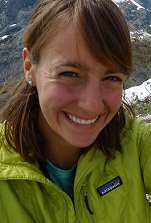
Tell us about your current position and career.
I just finished my PhD in March 2013 and now I work for the Vice Provost of Undergraduate Education at Stanford University. I am a half time lecturer for 3 science courses being taught to incoming freshmen, and the other half time I am conducting research for the Center of Groundwater Evaluation and Management. In my research I work with remotely sensed measurements of deformation in an attempt to infer hydrologic properties of groundwater systems in Colorado and California.
How has your Physics education helped you in your career?
My research is in Geophysics which is a pretty direct application of all the courses I took while at U of T in the Physics and Geology program. And the classes I am teaching have a lot of statistics, modelling and computer programming, so all that is coming in handy as well!
Leslie Ruo, BSc Physics/Geology Specialist '90
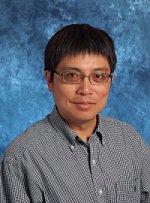
Tell us about your current position and career.
I am a high school teacher with Saskatoon Public Schools since September 1995. After my BSc, I went to the University of Saskatchewan for a MSc in geophysics. The MSc dragged on quite long (September 1990-April 1996), so I applied to enter the BEd program at U of S and actually started working as a teacher during my first year of teaching. I spent a lot of time programming in FORTRAN during grad school and this was great as I am now teaching computer science, computer applications and grades 9 and 10 science. I used to teach physics as well. I am on the provincial curricular writing team for Earth Science 30 (grade 12) and will pilot that course at the two schools I teach in this coming school year. I am also the Instructional Technology leader at the two schools I teach in. In this role, I try to find innovative ways to use technology in education. Here are two examples:
How has your Physics education helped you in your career?
I think the two examples I give above amply show how problem solving and mathematical skills learned from physics programs are key.
Knowing how to program a computer has been very useful for me. I have learned various languages along the way (Pascal, Javascript, Java, Python, PHP/MySQL) and it is what sets me apart from most others in my field. For example, schools often want to collect data for activity points - I created a MySQL database and PHP scripts which vastly simplified and automated the process. I can also write custom code when asked to (here is an example in PHP). So, in the past I processed seismic data with FORTRAN, today, I process information from MySQL databases with PHP.
I will always appreciate the kind mentorship of Jerry Mitrovica (a PhD student at the time) during the last two years of my program. Despite his obvious analytic strengths (a foil to my much more modest mathematical and physics abilities), Jerry never made me feel stupid and exuded his excitement for geophysics to me. It was actually the soft skills that I learned from Jerry that I now find the most important in today's vastly different career tracks.
Greg McFarquhar, BSc Physics/Mathematics Specialist '87, MSc Physics '89, PhD Physics '93
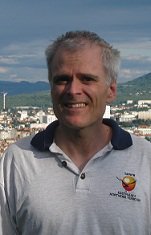
Tell us about your current position and career.
I am a professor in the Department of Atmospheric Sciences at the University of Illinois in Urbana-Champaign. I teach classes in atmospheric thermodynamics, cloud physics, meteorology and the role of clouds in climate and supervise research projects conducted by graduate and undergraduate students and postdoctoral fellows. I have funding from the National Science Foundation, the Department of Energy and NASA to conduct research on improving our fundamental understanding of cloud properties and processes, and their representation in weather and climate models. The majority of my work centers on analysis of data obtained by probes installed on research aircraft that measure the basic properties of cloud (e.g., size, shape, phase, concentration and scattering properties of cloud particles) over locations such as Australia, Alaska and Oklahoma.
How has your Physics education helped you in your career?
The most important skills I learned from my training in physics that I am currently using is my critical thinking skills and problem solving ability. In addition, the mathematical and computational skills honed from completion of countless problem sets have proved extremely useful in analysis of large data sets. Discussions with fellow students while figuring out solutions to these problems was also invaluable training for learning to work with groups of diverse individuals, something that I am always doing when working with large groups of people during meteorological field projects.
Alan R. Denton, BASc Engineering Science (Physics) '83, MSc Physics '84
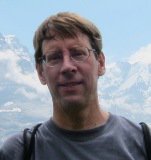
Tell us about your current position and career.
As an Associate Professor of Physics at NDSU, I divide my time between teaching, research, and service. My research interests are in theoretical and computational physics, focusing on effective interactions and self-assembly in soft materials, which are composed of macromolecules (e.g., colloids and polymers). I develop and apply statistical mechanical methods, including density-functional theory, Poisson-Boltzmann theory, Monte Carlo simulation, and molecular dynamics simulation. Especially exciting to me are applications to biological systems. I love teaching and have taught a spectrum of physics courses, from introductory to advanced graduate. My favourite form of service is outreach, taking science into the community. For example, I have organized several "Science Fun Nights" at local schools.
How has your Physics education helped you in your career?
At U of T, my undergraduate studies gave me a solid foundation in physics, mathematics, and analytical reasoning. Particularly inspiring for me was Professor Jan van Kranendonk's course in statistical mechanics. My Master's research with Professor Rashmi Desai deepened my interest in statistical physics of condensed matter. The problem-solving skills that I developed at U of T I now use on a daily basis.
Barbara McClary, BSc Physics '72, MSc Physics '73
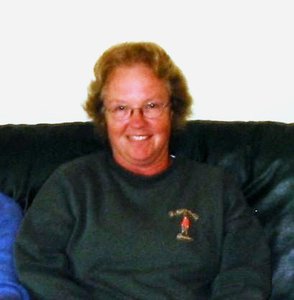
Tell us about your current position and career.
My career as a petroleum geophysicist began in 1976 and continued through good times and bad until my retirement from full time employment in 2004. I am currently working Brazil projects for a Calgary based exploration and production company that specializes in South America. My function includes the interpretation of reflection seismic data in five petroleum basins. I apply an understanding of geological depositional models to the data to map key rock layers and isolate anomalies or structures that have potential for hydrocarbon production. I gather and prepare the data, make the maps and pick well locations in consultation with geologists and engineers.
How has your Physics education helped you in your career?
The training that I received at the University of Toronto is critical in understanding the natural processes that we harness in oil exploration. I gather and analyze seismic data that will enable us to identify economic resources. I have also developed software as necessary to streamline tedious elements of the data handling and analysis. Winnowing information to isolate a relevant kernel is a necessary skill that I also learned as a student. This straight-ahead analysis is of little value if you cannot persuade management and investors to fund drilling and development. During my career, my experience working in collaborative projects as a student at U of T has been as valuable as my scientific training. Within my local professional community, there is a great deal of effort spent in making introductions among working professionals and university students in the hope that the latter will be prepared for our working environment.
Aharon Kagedan, HSBc Physics Specialist '05, MSc Physics '06
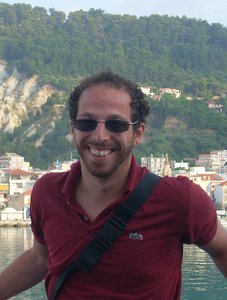
Tell us about your current position and career.
I am a senior manager in the Enterprise Strategy Group at RBC.
How has your Physics education helped you in your career?
Problem solving and critical thinking skills are key to a successful career in any context. Accessing information is easy, analyzing and using it is more complex. Physics has taught me how to think critically and truly understand the core of the challenges and questions we must address in our work.
